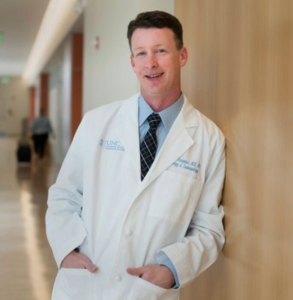
Richard Loeser, MD, PhD
Dr. Richard Loeser’s research focuses on understanding basic mechanisms relevant to joint tissue destruction in osteoarthritis. Osteoarthritis (OA) is the primary cause of pain and disability in older adults. A lack of treatments that slow or stop the progression of OA is a major limitation in the management of this very common condition. Once considered to be a degenerative, “wear and tear” condition of aging, recent studies including work from the Loeser lab at the Thurston Arthritis Research Center at UNC, have shown that OA is far more complex in origin. The disease is driven by a host of pro-inflammatory mediators produced within joint tissues such as cartilage, synovium, and bone; and in the knee, the meniscus.
The Loeser lab utilizes a combination of in vitro experiments, performed with human joint tissue cells including chondrocytes, and in vivo experiments, using mouse models of age-related and injury-induced OA, in order to study cell signaling pathways that regulate anabolic and catabolic activity responsible for joint tissue remodeling. When dysregulated, these pathways result in cell death and tissue destruction. A major focus of the lab’s current work centers around examining the mechanism by which reactive oxygen species (ROS) regulate cell signaling through oxidative post-translational modification of specific kinases and phosphatases. Recent proteomic studies from the lab have shown that this mechanism, which includes oxidation of specific protein thiols (R-SH) to sulfenic acid (R-SOH), regulates a chondrocyte signaling pathway that promotes production of matrix degrading metalloproteinases. These studies have also found that excessive levels of ROS, seen in oxidative stress conditions found in aging and after joint injury, disrupt matrix synthesis and cell survival signaling pathways, leading to loss of matrix repair and increased cell death. Ongoing studies are designed to discover key nodes in these pathways that can be targeted therapeutically to inhibit production of matrix degrading enzymes, promote cell survival and matrix repair, and ultimately stop the processes causing joint tissue destruction in OA.
Listen to Dr. Loeser’s podcast with Dr. Falk on osteoarthritis research.
Read more about Dr. Loeser and his research.

Scott Commins, MD, PhD
A recent addition to the Department of Medicine, Dr. Scott Commins brings with him some truly fascinating insights and perspectives. For example, his primary clinical and research interests are based on a surprising, but commonly held theory that tick and chigger bites can lead to patients developing an allergy to mammalian animals such as cows or pigs. Unlike traditional food allergy in many ways, one of the most significant characteristics of this particular allergy is that the reactions are often delayed 3-6 hours after eating beef, pork or lamb. Diagnosis, therefore, becomes quite a challenge. It turns out that spreading the word about this allergy is one of the most effective tools for identifying these patients – which has resulted in Dr. Commins receiving considerable interest from scientific community as well as the media. The alpha-gal red meat allergy is not new to UNC, however. In fact, the initial insights that began the research were in part due to physicians at our own UNC Lineberger Cancer Center. Since that time, UNC has continued to have a presence in the meat allergy research through Dr. Maya Jerath (also a member of the Rheumatology, Allergy & Immunology Division at the Thurston Arthritis Research Center).
Dr. Commins’ other focus is on eosinophilic esophagitis (EoE), which is a chronic, allergic inflammatory disease characterized by the accumulation of intraepithelial esophageal eosinophils. This immune process can be allergen-stimulated and results in esophageal dysfunction and fibrosis, leading to clinical symptoms of dysphagia and food impaction. Management of patients with EoE requires a team approach and Scott is looking forward to collaborating with other colleagues at UNC who are interested in this increasingly diagnosed disease.
Outside of work, Dr. Commins enjoys lively Friday night writing group sessions, cooking on a grill known as The Big Green Egg, and mountain biking. His lab is in Koury and Dr. Commins is open to collaboration, as well as discussion of why allergies are on the rise (or to local restaurant suggestions.)
Media Coverage:
- The Wall Street Journal: “Ticks that Spread Red-Meat Allergy”
- The Washington Post: “If you’re allergic to meat, antibiotics and other additives may not be the reason”
- CNN: “Ticks causing mysterious meat allergy”

Leigh F. Callahan, PhD
Dr. Leigh Callahan is an epidemiologist/musculoskeletal health outcomes researcher with over 30 years of experience in arthritis and health outcomes research, and extensive experience in public health as a former arthritis epidemiologist with the Centers for Disease Control and Prevention. Her primary areas of expertise are in four major categories: 1) outcomes and epidemiological research; 2) establishing research collaborations within UNC and in communities across North Carolina; 3) leadership roles in professional and nonprofit arthritis organizations; and 4) helping to set national arthritis public health agendas.
Over the past 15 years, Dr. Callahan has conducted 6 intervention trials of physical activity or behavioral lifestyle programs in participants with arthritis and joint pain. These studies were conducted with more than 1,700 individuals in 41 counties in North Carolina.
She served on the Steering Committee and also co-chaired the Intervention working group for a national Osteoarthritis (OA) Summit hosted jointly by the Arthritis Foundation, Centers for Disease Control and Prevention, and the National Institutes of Health. This resulted in the development of the National Public Health Agenda for Osteoarthritis as a blueprint for action, and set the stage for a collaborative and focused agenda to reduce the burden of osteoarthritis. She is Director of the Osteoarthritis Action Alliance, a coalition of more than 70 organizations committed to elevating OA as a national health priority, and which is managed by the Thurston Arthritis Research Center. Dr. Callahan also served as a member of an Institute of Medicine (IOM) Committee that produced the report, “Living Well with Chronic Illness: A Call for Public Health Action.”
View Dr. Callahan’s contributions.
Teresa Tarrant, MD
Dr. Teresa Tarrant first became interested in clinical immunology as a medical student studying autoimmune inflammatory eye disease at the National Institutes of Health. Since then, she has been inspired to understand what causes autoimmunity and immune deficiency disorders in order to improve the lives of her patients. Dr. Tarrant is uniquely trained and certified in both the fields of Allergy Immunology and Rheumatology. Combined with her immunology basic science background, her laboratory group has identified important pathways in autoimmunity, cell trafficking, and immune deficiency. A particular theme of research is cellular movement: normally, cells leave the circulation and migrate toward a target through a process called chemotaxis. Her research focuses on chemokine receptors (in particular CX3CR1, CCR2, CMKLR1, and CXCR4) and regulators of chemokine receptors (such as G-protein coupled receptor kinases [GRKs] and regulators of G protein synthesis [RGS]) that mediate the normal and abnormal movement of immune cells. The Tarrant lab studies these targets using cellular and molecular biology tools, animal models of human diseases for rheumatoid arthritis (RA) and immune deficiency, and translational studies using human samples.
Working in a highly collaborative institution, Dr. Tarrant enjoys working with scientists from the Departments of Chemistry, Pharmacy, Pharmacology, and Microbiology/Immunology. To this end, the Tarrant lab has used advanced imaging strategies to study therapeutic delivery of novel pharmacologic compounds in research models. The Tarrant lab has shown how important monocyte/macrophage inflammatory cells are to the clearance and delivery of nanomaterials in inflammation and in cancer. They are currently working on delivering and developing new pharmacologic anti-inflammatory compounds in arthritis animal models.
Dr. Tarrant is actively involved in support, education, scientific development, and advocacy for several foundations and national societies including the American College of Rheumatology, the Clinical Immunology Society, the American Academy of Allergy, Asthma, and Immunology, the Immune Deficiency Foundation, and the Rheumatology Research Foundation. Dr. Tarrant has successfully mentored trainees toward careers in academics, the biomedical industry, pharmacy, and medicine, and the Tarrant lab continues to be the reigning pumpkin carving champions of the Training Initiatives in Biomedical & Biological Sciences program at UNC!
An overview of published and presented work can be found on ResearchGate and Google Scholar.
Dr. Tarrant can be followed on Twitter @TKTarrant.